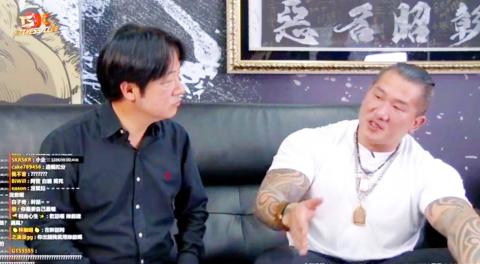Former premier William Lai (賴清德), who has registered as a candidate for the Democratic Progressive Party’s (DPP) presidential primary, in a livestream hosted by Internet celebrity Holger Chen (陳之漢) on Tuesday talked about the economy, reforms, nuclear energy and the primary.
Lai defined the DPP’s idea of an “independent Taiwan” as “Taiwan being an independent country named the Republic of China [ROC],” adding that there is no need to declare independence, as Taiwan fits every criterion of a sovereign nation.
Former presidents Chiang Kai-shek (蔣介石) and his son, Chiang Ching-kuo (蔣經國), supported taking back China for the ROC, Lai said, adding that if in the post-Chiang era their disciples were to accept unification, the ROC would cease to exist.

Screen grab from the Internet
President Tsai Ing-wen’s (蔡英文) New Year’s address was “tough” on national sovereignty issues and it is up to the Chinese Nationalist Party (KMT) to match her stance, Chen said.
Chinese President Xi Jinping’s (習近平) “five points” are pressuring the pan-blue camp to sign a peace accord, “but any such accord would be fake,” Lai said, adding that had a peace accord been useful, Tibet would not be in its current state.
He was referring to the 1951 Seventeen-Point Agreement for the Peaceful Liberation of Tibet, which promised religious freedom and autonomy for Tibetans.
“Taiwan should not become a second Hong Kong or Tibet,” Lai said.
He said he is running in the primary because pan-green camp supporters are worried that losing next year’s presidential election — along with fewer seats in the legislature — would be detrimental to the promotion of democratic values and the preservation of the nation’s sovereignty.
Responding to the issue of whether to grant a special pardon to former president Chen Shui-bian (陳水扁), Lai called for judiciary reforms so that everyone can have a fair and just trial, adding that the public should consider the case with more leniency.
Holger Chen said that soldiers, police officers and firefighters should have a pension program different from that for office workers due to the dangerous nature of their professions, and criticized the government’s decision to reduce the military budget, as well as pensions and benefits for retired police and military officers.
Lai said that reforming the pension fund for civil servants, military personnel and public-school teachers was necessary, as it was facing imminent insolvency.
The reductions would ensure the fund’s survival, Lai said, adding that without the reforms, civil servants, military personnel and public-school teachers would have no pensions.
Commenting on promoting non-partisan politics, Lai praised a collaboration between the pan-green and pan-blue camps.
Holger Chen said that police should be given greater authority.
Protesters from the China Unification Promotion Party often stage protests at the gym he runs, Holger Chen said, adding that such gang-like behavior should not be protected just because they operate under the guise of a political party.
Lai said that amendments last year to the Organized Crime Prevention Act (組織犯罪防制條例) provide greater leeway for police to crack down on gang-related activities.
Following the interview, Holger Chen was asked by reporters whether he supported Tsai or Lai, to which he said it would depend on their policies and stance on Taiwanese sovereignty.
People should retain their sovereignty and personal liberties regardless of which party is in power, he added.
Lai said that the interview was not purposefully scheduled to coincide with Tsai’s video conference with the Center for Strategic and International Studies, the Brookings Institution and the Woodrow Wilson International Center for Scholars.

An essay competition jointly organized by a local writing society and a publisher affiliated with the Chinese Communist Party (CCP) might have contravened the Act Governing Relations Between the People of the Taiwan Area and the Mainland Area (臺灣地區與大陸地區人民關係條例), the Mainland Affairs Council (MAC) said on Thursday. “In this case, the partner organization is clearly an agency under the CCP’s Fujian Provincial Committee,” MAC Deputy Minister and spokesperson Liang Wen-chieh (梁文傑) said at a news briefing in Taipei. “It also involves bringing Taiwanese students to China with all-expenses-paid arrangements to attend award ceremonies and camps,” Liang said. Those two “characteristics” are typically sufficient

A magnitude 5.9 earthquake that struck about 33km off the coast of Hualien City was the "main shock" in a series of quakes in the area, with aftershocks expected over the next three days, the Central Weather Administration (CWA) said yesterday. Prior to the magnitude 5.9 quake shaking most of Taiwan at 6:53pm yesterday, six other earthquakes stronger than a magnitude of 4, starting with a magnitude 5.5 quake at 6:09pm, occurred in the area. CWA Seismological Center Director Wu Chien-fu (吳健富) confirmed that the quakes were all part of the same series and that the magnitude 5.5 temblor was

The brilliant blue waters, thick foliage and bucolic atmosphere on this seemingly idyllic archipelago deep in the Pacific Ocean belie the key role it now plays in a titanic geopolitical struggle. Palau is again on the front line as China, and the US and its allies prepare their forces in an intensifying contest for control over the Asia-Pacific region. The democratic nation of just 17,000 people hosts US-controlled airstrips and soon-to-be-completed radar installations that the US military describes as “critical” to monitoring vast swathes of water and airspace. It is also a key piece of the second island chain, a string of

The Central Weather Administration has issued a heat alert for southeastern Taiwan, warning of temperatures as high as 36°C today, while alerting some coastal areas of strong winds later in the day. Kaohsiung’s Neimen District (內門) and Pingtung County’s Neipu Township (內埔) are under an orange heat alert, which warns of temperatures as high as 36°C for three consecutive days, the CWA said, citing southwest winds. The heat would also extend to Tainan’s Nansi (楠西) and Yujing (玉井) districts, as well as Pingtung’s Gaoshu (高樹), Yanpu (鹽埔) and Majia (瑪家) townships, it said, forecasting highs of up to 36°C in those areas